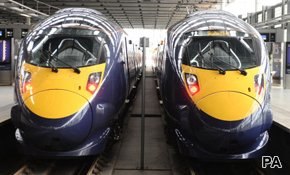
Train in vain: What’s keeping people from using the railways?
Rail travel is an omnipresent conversation topic in the UK, whether it revolves around the price of tickets, the merits and inconveniences of strikes, or the efficiency of services across the nation.
A new YouGov survey asked the British public about their attitudes towards train travel. Here’s what it found.
Barriers to train travel
The public agree that train travel has some merits: 56% say it is more sustainable and environmentally friendly than other forms of transport. But what’s keeping those who don’t from riding the rails?
The biggest barrier to train travel is – perhaps unsurprisingly, in the midst of a cost-of-living crisis – price. More than three in five respondents (63%) said ticket costs were the main impediment to them using the railways.
The next most significant barrier (and it is not a particularly close contest) is the relative convenience of driving, cited by 43% of respondents. In third place, the public cited unreliable service (39%), with crowding at rush hour near behind (38%). Again, cost crops up in sixth position, albeit in a different way: a third (34%) said the price of getting to and from the station to the destination got in the way of using this form of travel.
A related objection (limited train routes and destinations) follows behind in seventh, at 26%, with inconvenient schedules (21%) and distant stations (20%) the eighth and ninth most cited problem respectively. The tenth-highest barrier is accessibility (12%).
The importance of these barriers varies depending on demographics. For example, 71% of 45-54 year olds cite ticket prices as a barrier, as do 67% of over-55s; among 18-24s (45%) and 25-34s (53%) this is quite a bit lower. The youngest group here can receive a third off some travel if they hold a 16-25 Railcard.
What would make Britons use trains more?
We also asked the public what would compel them to use the country’s rail services a little more – and most said “cheaper tickets” (67%). Again, with belts tightening across the country, this makes a degree of sense. The second most popular option also relates to cost: the price of last-minute booking (35%).
The third most cited option for improvement (32%) is more frequent trains and more convenient timings, and the fourth is more convenient station locations (24%). Better promotions and deals take the fifth spot (23%) – tied with a desire for more single continuous journeys (23%). The bottom options are being able to book tickets more easily (16%) and a desire for more eco-friendly train travel (8%).
Again, older Britons (75% of the 45-54 demographic and 69% of the 55+ demographic) are more likely to think lower prices would remove barriers to using trains compared to younger Britons (57% of 18-24 year olds and 64% of 25-34 year olds).
Do Britons know how to bring down their rail fares?
There are a number of discounts available that can potentially reduce rail fares for Britons – but Britons aren’t aware of all of them. The highest awareness belongs to the Senior Railcard (50%), Off-Peak and Super Off-Peak tickets (49%), Advance tickets (44%), and Season Tickets (44%), with the 16-25 Railcard a little behind (39%).
A third of the public are aware of the Family & Friends Railcard (35%) and split ticketing (34%), with three in ten aware of discount websites and apps (29%). A quarter know about the 26-30 Railcard (25%) and the Disabled Persons Railcard (25%). No other form of discount commands more than a fifth of the public’s awareness.
Make smarter business decisions with better intelligence. Understand exactly what your audience is thinking by leveraging our panel of 27 million+ members. Speak with us today.